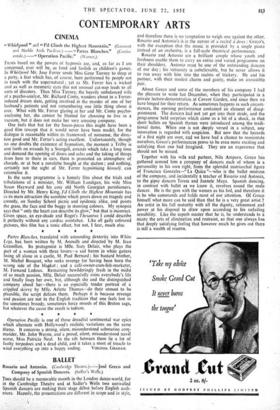CONTEMPORARY ARTS
CINEMA
“Whirlpool " and "I'd Climb the Highest Mountain." (Gaumont and Marble Arch Pavilion.) --“Pattes Blanches." (Cumin- entale.)—" Operation Pacific." (Warner,) Films based on the powers of hypnosis are, and, as far as I am concerned, ever will be, as fond and foolish as children's games. In Whirlpool Mr. Jose Ferrer sends Miss Gene Tierney to sleep at a party, a feat which has, of course, been performed by people not in touch with the supernatural ; yet as Mr. Ferrer has a wicked soul as well as mesmeric eyes this not unusual cat-nap leads to all sorts of disasters. Thus Miss Tierney, the heavily unbalanced wife of a psycho-analyst, Mr. Richard Conte, wanders about in a Ferrer- induced dream state, getting involved in the murder of one of her husband's patients and not remembering one little thing about it ever. What with Mr. Ferrer glaring at her and Mr. Conte psycho- analysing her, she cannot be blamed for choosing to live in a vacuum, but it does not make her very amusing company.
One feels that but for the hocus-pocus this might have been a good film (except that it would never have been made), for the dialogue is reasonable within its framework of nonsense, the direc- tion good and Mr. Ferrer's acting excellent. Unfortunately, though no one doubts the existence of hypnotism, the moment a Trilby is sent forth on errands by a Svengali, errands which take a long time and demand the opening of doors and safes and the taking of things from here to there in cars, there is promoted an atmosphere of charade, or at best a novelette bought at the station ; and nothing, certainly not the sight of Mr. Ferrer hypnotising himself, can rationalise it.
In the same programme is a homely film about the trials and tribulations of a minister, Mr. William Lundigan, his wife Miss Susan Hayward and his cosy old North Georgian parishioners. Directed by Mr. Henry King, l'd Clint!) the Highest Mountain has as its main attraction the sunshine which pours down on tragedy and comedy, on Sunday School picnic and epidemic alike, and paints the grass, the face and the buggy in stunning colours. My synopsis says that " only the heart can describe its glow," but that is incorrect. Given space, an eye-shade and Roget's Thesaurus I could describe it perfectly without any cardiac assistahce. Like all gaily coloured pictures, this film has a tonic effect, but not, I fear, much else.
Pastes Blanches, translated with astounding dexterity into White Legs, haS been written by M. Anouilh and directed by M. Jean Gremillon. Its protagonist is Mlle. Suzy Delair, who plays the part of a woman with three lovers—a sad baron in white gaiters living all alone in a castle, M. Paul Bernard ; his bastard brother, M. Michel Bouquet, who seeks revenge for having been born the wrong side of the blanket ; and a café-owner-cum-fish-marketer, M. Fernand Ledoux. Remaining bewilderingly fresh in the midst of so much passion, Mlle. Delair successfully ruins everybody's life and finally loses her own, but, although she and the distinguished company about her—there is an especially tender portrait of a crippled skivvy by Mlle. Arlette Thomas—do their utmost to be plausible, the script defeats them. Perhaps it is because revenge and passion are not in the English tradition that one feels lost in the sometimes broody, sometimes fierce moods of this Breton saga, but whatever the cause the result is tedium.
* *
Operation Pacific is one of those dreadful sentimental war epics which alternate with Hollywood's realistic variations on the same theme. It concerns a strong, silent, misunderstood submarine com- mander, Mr. John Wayne, and a proud, silent, misunderstood naval nurse, Miss Patricia Neal. In the. rift between them lie a lot of faulty torpedoes and a dead child, and it takes a mort of treacle to wind everything up into a happy ending. VIRGINIA GRAHAM.


















































 Previous page
Previous page